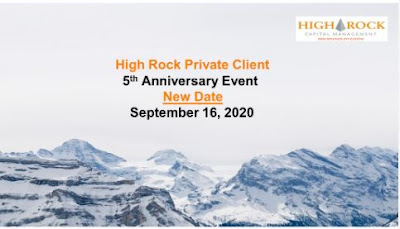"Hope For The Best, Prepare For The Worst"
That was a classic line that my canoeing partner would shout to me as we entered the white water on our paddling adventure down the great Missinaibi River of Northern Ontario (eventually flowing into James Bay, via the mighty Moose River) in 1980. It has stuck with me throughout my career managing risk (which began shortly thereafter) and in life and other subsequent canoeing adventures .
Yesterday, Federal Reserve Chairman Powell suggested the same: "
A text from my former canoeing partner this morning: "Ha! Chair Powell is listening".
The news on the economic front is not good. If the normally optimistic (they always want to inject a vision of economic confidence) U.S. Federal Reserve is planning for the worst, I think that anybody who takes risk (whether on their own or with the help of a professional) in financial markets, to grow their investments, ought to heed these words.
When I think of the word "Hope", it reminds me of all the possible outcomes that I wish I had control over, but don't, so I am reduced to hoping. So while the overly optimistic stock market cheerleaders are hoping that they will convince more unsuspecting buyers to throw caution to the wind and jump in to the feeding frenzy (FOMO and TINA) for which there is a named
From the
And for emphasis, the Q2 US GDP (-32.9%) announcement was released this morning. It is more than just "white water" turbulence, it is indeed a waterfall. Add to that, that 1.43 million Americans filed unemployment claims in the week ending July 25 and the Q3 GDP data are beginning to look pretty soft. Covid-19 is definitely impacting the outlook.
Once again, with persistent unemployment, consumer's (which account for about 2/3 of U.S. economic growth and slightly less in Canada) will not be driving economic growth.
The unemployed cannot borrow (banks will not lend to them) at record low interest rates. So regardless of how investors perceive the Fed's ability to back-stop financial markets and /or economic growth, they cannot force lending to those who are not creditworthy (unemployed). When the period of mortgage deferrals ends (1 in 5 Canadians have been utilizing this), there may be some reckoning for overly indebted households, putting further pressure on banks and the housing market.
The current state of the stock market these days (currently decoupled from economic reality) is tending to be driven by the need for instant gratification (day trading / gambling), which could, as traders become more anxious about a lack of upside momentum (valuations are very stretched), bring about an exodus that may in turn bring about a return to reality and a focus on the medium term that the Fed has suggested is fraught with uncertainty.
For this, we shall be prepared.












